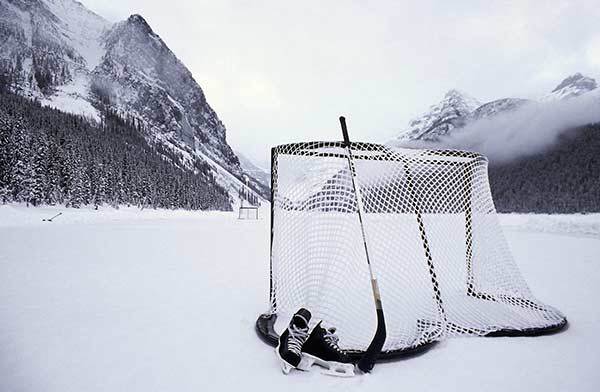“Now in the beginning, God made the heavens and the earth. On the first day he made cheeseburgers. On the second day he made air conditioning. On the third day he made blue jeans. On the fourth day, he made ROCK AND ROLL. And then he rested on the seventh day, and took a ride with his baby in his Cadillac” – Bruce Springsteen
At least, according to the Boss, who was somewhere between a bicep curl and a bench press, that’s how it all started. Some may call the validity of his claims into question (though the priority of cheeseburgers is rarely disputed), but they are no more credible or absurd than the next person’s. We all have beliefs, and the stories to justify them. As Thomas King acknowledges, stories of our world’s creation come in all different shapes and sizes. Among all the discrepancies between stories and personal accounts, some things persist. Most notably the existence of good and evil, a right and a wrong, a black and a white. Not only do these things exist, they exist for a reason, as a lesson, a constant reminder of why or why not. They remind us what to thank for the good, and loathe for the bad.
So here’s my story about Evil
Evil was 17 and gorgeous. The talk of the small town she lived in. She was in a league of her own. She was all the boys talked about, dreamed about. And there she was: Bleach blonde hair, acid wash jeans, black leather jacket, and a Marlborough Red hanging from her lip, standing with her back against the record machine as Van Halen’s “Jump” pumped through the local diner speakers. The local boys were in a trance, eyes locked on her, until she noticed them, at which point they all awkwardly diverted their stare to the milkshakes in front of them. Except for Jimmy, who fell victim to the day dream Evil put so many boys in. After 5 more seconds and several of Jimmy’s friends’ elbows being nudged into his kidneys to no avail, Evil addressed the situation, suggesting Jimmy take a picture. “It might last longer” she said. Suddenly Jimmy awakened from his fantasy, and was left scrambling for a recovery. “Uhhhh” Jimmy says “There was a clock over your head, I was trying to see what time it w–“. There was no clock, and Evil didn’t have time for the next five excuses that were about to come out of Jimmy’s mouth. Evil pivoted on her four inch heel and headed for the door, a trail of blonde hair followed. Just like that she was gone.
Rumour had it Evil liked the bad boy types. Maybe that was the key to her heart the diner boys thought. So they rolled up the cuffs of their jeans, slicked back their hair, cut off their sleeves, and kept a steady rotation of toothpicks and cigarettes in their mouths. Over the following weeks, the obsession with Evil became addicting for the boys, and it was not long before newfound teenage testosterone turned the pursuit of Evil into an all out competition, each pushing the envelope.
Jimmy lit up a cigarette, a newly adopted hobby his teenage lungs evidently disagreed with, judging by the coughing fit that followed each inhale. “I remember my first smoke” one of his buddies quipped, all part of the endless exchange of jabs and chirps among the boys in the constant struggle for group supremacy. Jimmy chased the whole scene down with a beer one of the boys had stolen from home and diverted his attention to the ’82 Ford Mustang convertible idling in the gas station parking lot across the street. The owner had disappeared inside a couple of minutes prior. Jimmy was tired of playing catch-up to whatever the group’s new material attempt at bad was. He figured it was time he set the bar. He took one quick look around, the owner was nowhere in sight. Jimmy slipped out of the group’s circle and walked over to the car. He opened the door and slipped in the driver seat as his friends voices faded in the distance. Suddenly, they were louder. “What the hell ya doing Jimmy!?” “Alright jokes over Jimmy get outta’ there before we get in trouble”. The car still running, Jimmy pumped the clutch, threw it in first and headed for the highway. He took one last glance at the group as a mesh of sudden excitement, disbelief, and horror all battled for dominance on each of their faces. Jimmy basked in the moment, which was suddenly interrupted by a loud New York accent, “HEY I’M WALKIN’ HERE!”. BRAKES! Jimmy realized, as he stopped several inches shy of the man crossing the street. Startled, Jimmy waited the longest three seconds of his life for the man to cross the street, and then he was off.
One lap around the block he figured. Jimmy pulled a Guns N’ Roses tape out of his portable cassette player and popped it in the stereo. The wind blowing through his mullet, Jimmy felt a little more relaxed. Maybe two blocks, Jimmy thought. And then three, then four, and then seven, where in the distance he saw Evil, on the sidewalk, walking towards him. Jimmy’s heart pumped faster and faster, as he anticipated the moment that was about to ensue. The perfect storm, the crossroads, this is what it had all been about. Jimmy had been so lost in the moment, he failed to notice the car racing up behind him, the red and blue lights flashing, the siren wailing. Until finally he did. The horrible realization, the regret, hit him like a gunshot to the stomach. How could I have thought I would get away with this? How could I have not seen this coming? Jimmy pulled over and came to a stop as Evil walked by with a curious stare. The baddest thing of all was happening to Jimmy right in front of Evil: busted with a red-hot car right in front of the ice queen herself. But Jimmy couldn’t savour the moment. As Evil walked past the car Jimmy diverted his attention to the officer approaching it. “Does this vehicle belong to you son?” said the officer. Jimmy unable to speak, as if a bowling ball was lodged in his throat, shook his head. “Well son, you’re in a lot of trouble”. Jimmy wished he could rewind his life back ten minutes to the gas station, slap himself in the face, knock the whole idea out of his head in the first place. But he couldn’t, for once a story is told, it cannot be called back.
Observation
I found this assignment particularly hard, and the absurd story presented above was really a reflection of my frustration writing it and eventually just running with a crazy idea. To my surprise, my mother, whom I told the story too, really enjoyed it, though it didn’t take her long to poke holes at various parts of it.
Works Cited
Burr, Bill (Producer) & Mohr, Jay (Guest). (2014, January 16). Monday Morning Podcast [Audio podcast].
Retrieved from http://itunes.apple.com
King, Thomas. The Truth About Stories: A Native Narrative. Peterbough: Anansi Press. 2003. Print.

